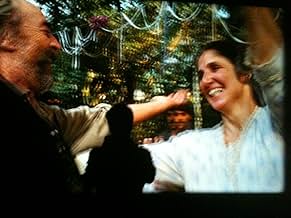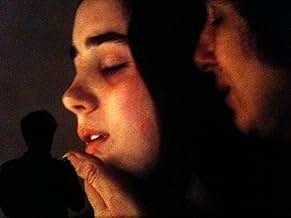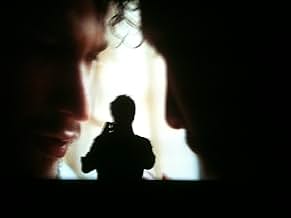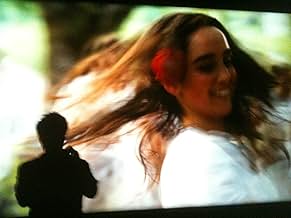AVALIAÇÃO DA IMDb
7,5/10
2,2 mil
SUA AVALIAÇÃO
O jovem filho que fugiu de sua família dominante desce à decadência e depois volta para o ninho. Pais tirânicos, incesto, conflitos familiares ferozes e um estilo visual intenso a combinar.O jovem filho que fugiu de sua família dominante desce à decadência e depois volta para o ninho. Pais tirânicos, incesto, conflitos familiares ferozes e um estilo visual intenso a combinar.O jovem filho que fugiu de sua família dominante desce à decadência e depois volta para o ninho. Pais tirânicos, incesto, conflitos familiares ferozes e um estilo visual intenso a combinar.
- Direção
- Roteiristas
- Artistas
- Prêmios
- 52 vitórias e 28 indicações no total
- Direção
- Roteiristas
- Elenco e equipe completos
- Produção, bilheteria e muito mais no IMDbPro
Avaliações em destaque
"Lavoura Arcaica" (aka "To The Left of the Father") is one of the most intense films you'll ever see - love it or hate it, it'll be a real experience for you. Devastating could be the best word to describe this masterpiece, based upon Raduan Nassar's brief, but strong novel of the same name. I've wanted to see this film since when it came out, back in 2001 - I read the novel the following year, when I was 14, and was thoroughly fascinated; the film would only be released on DVD in late 2005, and only now I could find a copy and finally watch it. It was worth the wait.
Luiz Fernando Carvalho, who had directed lots of soap operas before making his stunning feature directorial debut, didn't have a screenplay - everything was improvised on the novel, in a process Carvalho called a "reaction", rather than an adaptation, to the exquisite book. The tragic story of André (Selton Mello, perhaps the most versatile Brazilian actor of his generation) who leaves his home because of his tormented passion for his sister Ana (Simone Spoladore), is told with astounding visual taste by Luiz Fernando and cinematographer Walter Carvalho ("Central Station"), a remarkable original score by Marco Antônio Guimarães, and a flawless cast (including sacred monster Raul Cortez and Juliana Carneiro da Cunha as the parents). This is definitely not a film for all tastes, though; 170 minutes long, slow and spoken in Baroque Portuguese (I'm not sure English subtitles can make full justice to Nassar's poetic narrative; but then again, if you don't avoid Wong Kar-Wai's films just because you don't speak Chinese - I certainly don't - you'll be smart enough not to ignore this film). I'd compare "Lavoura Arcaica" to Terrence Malick and Pier Paolo Pasolini, but Luiz Fernando Carvalho managed to make a unique film with his own style. Well deserved winner of over 30 international awards, this is a film that must be discovered. 10/10 in my books.
Luiz Fernando Carvalho, who had directed lots of soap operas before making his stunning feature directorial debut, didn't have a screenplay - everything was improvised on the novel, in a process Carvalho called a "reaction", rather than an adaptation, to the exquisite book. The tragic story of André (Selton Mello, perhaps the most versatile Brazilian actor of his generation) who leaves his home because of his tormented passion for his sister Ana (Simone Spoladore), is told with astounding visual taste by Luiz Fernando and cinematographer Walter Carvalho ("Central Station"), a remarkable original score by Marco Antônio Guimarães, and a flawless cast (including sacred monster Raul Cortez and Juliana Carneiro da Cunha as the parents). This is definitely not a film for all tastes, though; 170 minutes long, slow and spoken in Baroque Portuguese (I'm not sure English subtitles can make full justice to Nassar's poetic narrative; but then again, if you don't avoid Wong Kar-Wai's films just because you don't speak Chinese - I certainly don't - you'll be smart enough not to ignore this film). I'd compare "Lavoura Arcaica" to Terrence Malick and Pier Paolo Pasolini, but Luiz Fernando Carvalho managed to make a unique film with his own style. Well deserved winner of over 30 international awards, this is a film that must be discovered. 10/10 in my books.
Saw this at HIFF 2002, Helsinki, Finland. 2 hours and 40 minutes seemed a bit much to me too, as to this is no film to enchant and suck you into the story. Extremely beautiful, but literal, heavy, and in the end: boring. Reminds me of the finnish theater tradition... I haven't read the book. Perhaps I should, as to the story in itself seems strong and interesting enough. Only the writer of the screenplay doesn't seem to have thought about the audiences not familiar with the novel. Perhaps it's also a culture thing. Still, I can't say I regret watching this film.
10flasuss
This movie gained a cult-status because it won more than 30 international awards, received more praise from the Brazilian critics than any other feature of that year, but was never released on DVD or VHS until last week. But the waiting wasn't worthless: the movie is a masterpiece. Few films are so honest and love their characters so much as this one, and has so much faith in it's material. Carvalho's directing is clearly very elaborate, and makes every frame seems poetic... The baroque cinematography and the score reflects perfectly the mood of the characters, the sound mixing is nearly perfect, and the cast is, without exception, magnificent. Certainly one of the most overlooked films ever, but this time, the public cannot be blamed.
This is, without a doubt, one of the best movies I have ever seen. It is a spectacular example of the new brazillian movie-making!
It is a technically perfect movie, with a brilliant cinematography and a masterful photography. The scenes are very well built and the director truly owns this movie. Of course, it derives from one of the masterpieces of recent literature, Raduan Nassar's impressive novel.
I thoroughly enjoyed the movie and have to disagree with Flavio Velames comment, complaining about it being too erudite. There's only such thing if a movie is pretensious, which is obviously not the case: this movie breathes honesty. There are already enough "common" movies being produced around the world to commit the crime of discarding this one for not being "common". Not all movies are supposed to be for the audience to have "fun". Some of them (the best ones) are supposed to enchant you, as this one does.
Keep up the extraordinary work, Luiz Fernando Carvalho! I had the opportunity of attending the screening of this movie at the Film Festival Rotterdam 2002, where Luiz Fernando spoke. Enlightening. True art and true artist. Thank you.
It is a technically perfect movie, with a brilliant cinematography and a masterful photography. The scenes are very well built and the director truly owns this movie. Of course, it derives from one of the masterpieces of recent literature, Raduan Nassar's impressive novel.
I thoroughly enjoyed the movie and have to disagree with Flavio Velames comment, complaining about it being too erudite. There's only such thing if a movie is pretensious, which is obviously not the case: this movie breathes honesty. There are already enough "common" movies being produced around the world to commit the crime of discarding this one for not being "common". Not all movies are supposed to be for the audience to have "fun". Some of them (the best ones) are supposed to enchant you, as this one does.
Keep up the extraordinary work, Luiz Fernando Carvalho! I had the opportunity of attending the screening of this movie at the Film Festival Rotterdam 2002, where Luiz Fernando spoke. Enlightening. True art and true artist. Thank you.
10groggo
'Stunning' is not an exaggerated word to describe this film. The images are haunting, and I saw it on the small screen at home. I can only imagine what it must have looked like in a theatre.
Director Luiz Fernando Carvalho is masterful in meticulously capturing the poetic word rhythms of novelist Raduan Nassar, who wrote this metaphysical, philosophical work. The largely verbatim prose-poetry (direct from Nasar's book), spoken improvisationally by the actors, is psychologically multi-layered. It is all brilliantly complemented by Walter Cavalho's multi-award-winning cinematography. Cavalho's disturbing and often sumptuous images linger long after the screen has turned dark. One is reminded of Sven Nykvist's haunting style of 'still-life-photography' in films, particularly those made with Ingmar Bergman.
Lavoura Carcaica is almost three hours long, and (isn't this always the way with great films?) it requires an almost immediate re-viewing. One just cannot absorb the language and imagery in one sitting.
The ensemble acting is first-rate. Sultan Mello is the tortured son in temporary self-imposed exile from his family, who yearns (shamefully) for the love and sensual heat of his sister Ana's body; Simone Spoladore is the innocent, sweet-faced Ana, who expresses her desire for love by dancing (the images are more erotic than 99% of the soft-core sex you see in mainstream movies these days); Juliana Carneiro da Cunha is the loving, long-suffering mother who is an exemplar of maternity, a woman who sacrifices everything to her children, and particularly her 'pet,' Andre (Mello); and Raul Cortez is simply astonishing to watch as the austere, evangelistic, hypocritical father who rages about the primacy of familial love but doesn't really understand its true meaning when it comes to his own children.
This is a film that well deserved its many nominations and awards. It is deeply challenging and demanding, and it almost certainly would never have been made in Hollywood.
Director Luiz Fernando Carvalho is masterful in meticulously capturing the poetic word rhythms of novelist Raduan Nassar, who wrote this metaphysical, philosophical work. The largely verbatim prose-poetry (direct from Nasar's book), spoken improvisationally by the actors, is psychologically multi-layered. It is all brilliantly complemented by Walter Cavalho's multi-award-winning cinematography. Cavalho's disturbing and often sumptuous images linger long after the screen has turned dark. One is reminded of Sven Nykvist's haunting style of 'still-life-photography' in films, particularly those made with Ingmar Bergman.
Lavoura Carcaica is almost three hours long, and (isn't this always the way with great films?) it requires an almost immediate re-viewing. One just cannot absorb the language and imagery in one sitting.
The ensemble acting is first-rate. Sultan Mello is the tortured son in temporary self-imposed exile from his family, who yearns (shamefully) for the love and sensual heat of his sister Ana's body; Simone Spoladore is the innocent, sweet-faced Ana, who expresses her desire for love by dancing (the images are more erotic than 99% of the soft-core sex you see in mainstream movies these days); Juliana Carneiro da Cunha is the loving, long-suffering mother who is an exemplar of maternity, a woman who sacrifices everything to her children, and particularly her 'pet,' Andre (Mello); and Raul Cortez is simply astonishing to watch as the austere, evangelistic, hypocritical father who rages about the primacy of familial love but doesn't really understand its true meaning when it comes to his own children.
This is a film that well deserved its many nominations and awards. It is deeply challenging and demanding, and it almost certainly would never have been made in Hollywood.
Você sabia?
- CuriosidadesIs Luiz Fernando Carvalho's feature film debut.
Principais escolhas
Faça login para avaliar e ver a lista de recomendações personalizadas
- How long is To the Left of the Father?Fornecido pela Alexa
Detalhes
- Data de lançamento
- País de origem
- Central de atendimento oficial
- Idioma
- Também conhecido como
- LavourArcaica
- Locações de filme
- Minas Gerais, Brasil(Exterior)
- Empresas de produção
- Consulte mais créditos da empresa na IMDbPro
Bilheteria
- Faturamento bruto mundial
- US$ 518.908
Contribua para esta página
Sugerir uma alteração ou adicionar conteúdo ausente



























